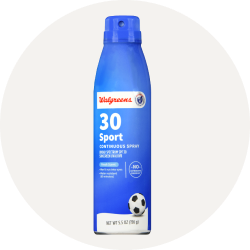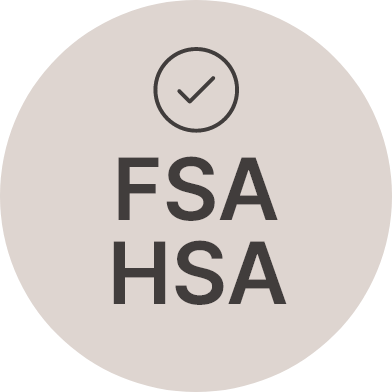
Maximize your FSA funds
FSA dollars are "use or lose" so spend your dollars now before they expire.*

FSA- and HSA-eligible products, such as contact lenses, first aid supplies and sun care, can be paid for in store or online with your FSA or HSA card.†
With the passing of the 2020 CARES Act, many new items and categories are now eligible without a prescription, including cough and cold, allergy and sinus relief and more. Contact your FSA administrator for more information.
























If you have a health plan through a job, you can use a Flexible Spending Account (FSA) for copayments, deductibles, some drug costs and other health care expenses. Using an FSA can also reduce your taxes.
A Flexible Spending Account (also known as a flexible spending arrangement) is a special account into which you deposit money to pay certain out-of-pocket health care costs. You don't pay taxes on these funds, so you'll save money on the amount you set aside.
Employers may make contributions to your FSA but aren't required to. For details about your company's FSA, including how to sign up, ask your employer.
To use your account, simply submit a claim to the FSA (through your employer) with proof of the medical expense and a statement that it has not been covered by your plan. You will then receive reimbursement for your costs. Ask your employer about how to use your specific FSA.
FSAs are limited to $3,200 per year, per employer in 2024. If you're married, your spouse can add up to $3,200 in an FSA with their employer, too.
You may use funds in your FSA to pay for certain medical and dental expenses for yourself, your spouse and your dependents.
You can spend these funds on deductibles & copayments but not insurance premiums.
Additionally, you can use these funds to pay for prescription medications and over-the-counter medicines with a doctor's prescription. Reimbursements for insulin are allowed without an Rx.
FSAs may also be used to cover costs of medical equipment, such as crutches; supplies, such as bandages; and diagnostic devices, including blood sugar test kits.
If you're enrolled in an HSA, you may only use a Limited Purpose FSA for dental or vision expenses.
Yes, funds from both types of accounts can be used online and in store. When shopping in store, items in your basket will be divided into two buckets: FSA/HSA and non-FSA/HSA. You will be able to pay for the former with an FSA/HSA card. Then, you can pay for the latter separately.
When shopping in store or online, you can use an FSA or HSA debit card supplied by your health insurer to purchase eligible items. The total amount will be automatically deducted from your account. You can also save, email or print out your purchase confirmation page or receipt, and then submit it to your FSA or HSA account administrator for reimbursement.
For additional information about Flexible Spending Accounts or Health Savings Accounts, please contact your healthcare plan administrator.
FSA: https://www.healthcare.gov/have-job-based-coverage/flexible-spending-accounts/Opens in a new tab
HSA: https://www.healthcare.gov/glossary/health-savings-account-hsa/Opens in a new tab
IRS: https://www.irs.gov/pub/irs-pdf/p969.pdfOpens pdf in a new tab
A Health Savings Account (HSA) lets you set aside money on a pre-tax basis to pay for qualified medical expenses. By using untaxed dollars in an HSA for deductibles, copayments, coinsurance and some other expenses, you may be able to lower your overall healthcare costs. Generally, HSA funds may not be used to pay for premiums.
While you can use the funds in an HSA at any time to pay for qualified medical expenses, you may contribute to an HSA only if you have a High Deductible Health Plan (HDHP), which can include one from the Marketplace. This generally is a plan that only covers preventive services before the deductible.
At the age of 65, you can begin taking distributions from your HSA for any reason without paying a penalty. If you use the money to pay for a qualified medical expense, you don't have to pay taxes on it. This money is usually taxable when withdrawn and used for other types of expenses. At age 55, you may contribute an additional $1,000 each year to your HSA. For 2024, you can contribute up to $4,150 if you have self-only coverage or up to $8,300 for family coverage.
Some health insurance companies offer HSAs for their HDHPs. Check with your company. You can also open an HSA through some banks and other financial institutions.
Check with your plan provider regarding which items are eligible for FSA and HSA. You can typically use funds in your FSA or HSA account to cover the costs of a number of products Walgreens offers, including:
FSA- and HSA-eligible products, such as contact lenses, first aid supplies and sun care, can be paid for in store or online with your FSA or HSA card. With the passing of the 2020 CARES Act, many new items and categories are now eligible without a prescription, including cough and cold, allergy and sinus and more. Contact your FSA administrator for more information.
* If using an FSA debit card for payments, FSA-eligible products must be ordered no later than December 28, 2025 for FSA funds expiring December 31, 2025. Payment is not charged until orders have shipped.
† Restrictions apply. See Walgreens.com/OfferDetails for more information.
Restrictions apply. Free shipping details | Free Ship to Store details | Walgreens return policy